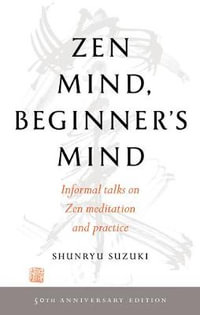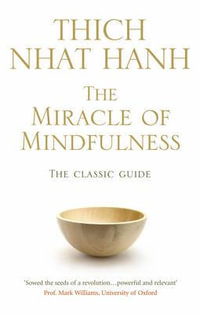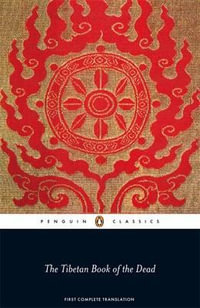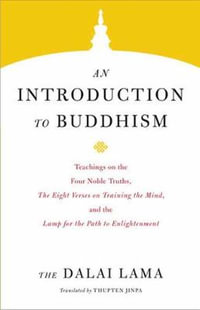
At a Glance
Paperback
220 Pages
220 Pages
Dimensions(cm)
14.8 x 22.7 x 1.6
14.8 x 22.7 x 1.6
Paperback
$73.59
or 4 interest-free payments of $18.40 with
orAims to ship in 7 to 10 business days
With the growing popularity of Zen Buddhism in the West, virtually everyone knows, or thinks they know, what a koan is: a brief and baffling question or statement that cannot be solved by the logical mind and which, after sustained concentration, can lead to sudden enlightenment. But the truth about koans is both simpler--and more complicated--than this.
In Opening a Mountain, Steven Heine shows that koans, and the questions we associate with them--such as "What is the sound of one hand clapping?"--are embedded in larger narratives and belong to an ancient Buddhist tradition of "encounter dialogues." These dialogues feature dramatic and often inscrutable contests between masters and disciples, or between masters and an array of natural and supernatural forces: rouge priests, "wild foxes," hermits, wizards, shapeshifters, magical animals, and dangerous women. To establish a new monastery, "to open a mountain," the Zen master had to tame these wild forces in regions most remote from civilization. In these extraordinary encounters, fingers and arms are cut off, pitchers are kicked over, masters appear in and interpret each other's dreams, and seemingly absurd statements are shown to reveal the deepest insights. Heine restores these koans to their original traditions, allowing readers to see both the complex elements of Chinese
culture and religion that they reflect and the role they played in Zen's transformation of local superstitions into its own teachings.
Offering a fresh approach to one of the most crucial elements of Zen Buddhism, Opening a Mountain is essential reading for anyone seeking to understand the full story behind koans and the mysterious worlds they come from.
In Opening a Mountain, Steven Heine shows that koans, and the questions we associate with them--such as "What is the sound of one hand clapping?"--are embedded in larger narratives and belong to an ancient Buddhist tradition of "encounter dialogues." These dialogues feature dramatic and often inscrutable contests between masters and disciples, or between masters and an array of natural and supernatural forces: rouge priests, "wild foxes," hermits, wizards, shapeshifters, magical animals, and dangerous women. To establish a new monastery, "to open a mountain," the Zen master had to tame these wild forces in regions most remote from civilization. In these extraordinary encounters, fingers and arms are cut off, pitchers are kicked over, masters appear in and interpret each other's dreams, and seemingly absurd statements are shown to reveal the deepest insights. Heine restores these koans to their original traditions, allowing readers to see both the complex elements of Chinese
culture and religion that they reflect and the role they played in Zen's transformation of local superstitions into its own teachings.
Offering a fresh approach to one of the most crucial elements of Zen Buddhism, Opening a Mountain is essential reading for anyone seeking to understand the full story behind koans and the mysterious worlds they come from.
Industry Reviews
"This is an innovative reading and presentation of Zen literature. It breaks new ground in the study of Zen and in the interpretation of k=oan literature, setting a standard for these in terms of scholarly rigor and broad accessibility that is truly impressive. Opening a Mountain will encourage us to read k=oans in much more articulate literary, sociological, and historical setting than we have previously managed. This is an excellent book."
--Philosophy East & West
"This is an innovative reading and presentation of Zen literature. It breaks new ground in the study of Zen and in the interpretation of koan literature, setting a standard for these in terms of scholarly rigor and broad accessibility that is truly impressive. Opening a Mountain will encourage us to read koans in a much more articulate literary, sociological, and historical setting than we have previously managed. This is an excellent
book."--H-Net
"Erudite and well-researched.... Religious scholar and historian Heine is well-qualified to guide an exploration of the contexts from which various koans have emerged. The book is fascinating."--NAPRA Review
"A respectful and respectable contribution to the growing body of contemporary Buddhist studies at a time when Buddhism is establishing a vital presence in the American religious landscape."--Publishers Weekly
"Heine is an accomplished, deft writer.... For those intrigued with koans, the enigmatic teachings of Zen Buddhism, this text offers translations of and critical commentary on sixty of these always lively, often maddening, anecdotes."--The Asian Reporter
"An important step towards reading the Zen records more within the context of the broader cultural environment that generated them." --Japanese Religions
"...Heine occupies a unique position as an original thinker and synthesizer"--Jimmy Yu,Florida State University
"...this and other passages present Heine almost as a Zen masters."--Jimmy Yu, Florida State University
| Sources | p. xi |
| Preface | p. xiii |
| Introduction: What Are Koans? | p. 1 |
| Sticks and Stones, but It's No-Names That Hurt | p. 1 |
| On the Conventional Understanding of Koans | p. 4 |
| Marvelous and Ritual Elements in Koans | p. 5 |
| The Case of Chu-chih Cutting Off a Finger | p. 9 |
| The Mythological Background of Koan Literature | p. 13 |
| Zen Masters and Their Mountains | p. 20 |
| Koan Themes and Sources | p. 25 |
| Themes | p. 26 |
| Sources | p. 28 |
| On Reading Koans | p. 30 |
| Surveying Mountain Landscapes | p. 37 |
| Northern and Ox Head Schools | p. 39 |
| Yuan-kuei Subdues the Mountain God | p. 39 |
| Tao-shu and the Trickster | p. 41 |
| Master Chiang-mo, Subjugator of Demons | p. 42 |
| Does Niu-t'ou Need the Flowers? | p. 44 |
| Southern School | p. 46 |
| Pai-chang Meditates On Ta-hsiung Peak | p. 46 |
| Kuei-shan Kicks Over the Water Pitcher | p. 48 |
| Te-shan Carrying His Bundle | p. 51 |
| Nan-ch'uan Sweeping On a Mountain | p. 55 |
| Hsuan-sha's "One Luminous Pearl" | p. 57 |
| Tung-shan's Mountain | p. 58 |
| Tung-shan's "Two Clay Oxen Enter the Sea" | p. 58 |
| Yun-yen's "Non-Sentient Beings Can Hear It" | p. 60 |
| Yun-chu Wandering the Mountains | p. 62 |
| Mount Wu-t'ai | p. 64 |
| "Iron Grindstone" Liu Goes to Mount Wu-t'ai | p. 64 |
| Manjusri's "Three by Three" | p. 66 |
| Pi-mo's "You Shall Die from My Pitchfork" | p. 70 |
| Contesting with Irregular Rivals | p. 73 |
| Hermits, Wizards, and Other Masters | p. 75 |
| P'u-hua Kicks Over the Dining Table | p. 75 |
| The Tripitaka Monk Claims to Read Others' Minds | p. 77 |
| A Hermit's "The Mountain Torrent Runs Deep, So the Ladle Is Long" | p. 80 |
| Chao-chou Checks Out Two Hermits | p. 82 |
| Hsueh-feng's "What Is This?" | p. 84 |
| Jui-yen Calls Out to Himself, "Master" | p. 87 |
| Ti-tsang Planting the Fields | p. 89 |
| Dangerous Women: Zen "Grannies" and Nuns | p. 91 |
| Chao-chou Checks Out an Old Woman | p. 91 |
| Te-shan and the Woman Selling Rice Cakes | p. 94 |
| Mo-shan Opens Her Mouth | p. 96 |
| Chao-chou Recites the Sutras | p. 98 |
| Encountering Supernatural Forces | p. 101 |
| Trance, Visions, and Dreams | p. 103 |
| A Woman Comes Out of Absorption | p. 103 |
| Huang-po's "Gobblers of Dregs" | p. 106 |
| Sermon from the Third Seat | p. 109 |
| Kuei-shan Turns His Face to the Wall | p. 111 |
| Spirits, Gods, and Bodhisattvas | p. 114 |
| P'u-chi Subdues the Hearth God | p. 114 |
| Nan-ch'uan Is Greeted by the Earth-Deity | p. 116 |
| The Tea Ceremony at Chao-ch'ing | p. 118 |
| Hu-kuo's Three Embarrassments | p. 121 |
| Yun-chu and the Spirits | p. 123 |
| The World Honored One Ascends the High Seat | p. 125 |
| Magical Animals | p. 127 |
| A Snake Appears in the Relic Box | p. 127 |
| Pai-chang and the Wild Fox | p. 129 |
| Ta-kuang Does a Dance | p. 133 |
| Hsueh-feng and the Turtle-Nosed Snake | p. 136 |
| Wielding Symbols of Authority and Transmission | p. 141 |
| Symbols of Authority | p. 143 |
| Chih-men's "I Have This Power" | p. 143 |
| Yun-men's Staff Changes into a Dragon | p. 145 |
| Kan-feng's Single Route | p. 147 |
| The Hermit of Lotus Flower Peak Holds Up His Staff | p. 150 |
| Ch'ing-yuan Raises His Fly-Whisk | p. 153 |
| Transmission Symbols | p. 156 |
| Hui-neng's Immovable Robe | p. 156 |
| Tung-shan Makes Offerings Before the Image | p. 159 |
| Prime Minister P'ei-hsiu Replies, "Yes" | p. 161 |
| Yang-shan's "Just About Enough" | p. 164 |
| Confessional Experiences: Giving Life and Controlling Death | p. 169 |
| Repentance and Self-Mutilation | p. 171 |
| Chih-yen Converts a Hunter | p. 171 |
| Chu-chih's One Finger Zen | p. 173 |
| Nalakuvara Broke His Bones and Tore His Flesh | p. 176 |
| Bodhidharma Pacifies the Mind | p. 177 |
| Hui-k'o Absolves Sin | p. 180 |
| Dogen Disciplines Monk Gemmyo | p. 182 |
| Death, Relics, and Ghosts | p. 184 |
| A Woman's True Soul? | p. 184 |
| P'u-hua Passes Away | p. 187 |
| Jiu-feng Does Not Concur | p. 189 |
| A Hermit Seeks to be Saved | p. 192 |
| Tao-wu Makes a Condolence Call | p. 193 |
| Zen Figures Cited | p. 197 |
| Table of Contents provided by Ingram. All Rights Reserved. |
ISBN: 9780195174342
ISBN-10: 0195174348
Published: 1st January 2004
Format: Paperback
Language: English
Number of Pages: 220
Audience: Professional and Scholarly
Publisher: Oxford University Press USA
Country of Publication: GB
Dimensions (cm): 14.8 x 22.7 x 1.6
Weight (kg): 0.32
Shipping
| Standard Shipping | Express Shipping | |
|---|---|---|
| Metro postcodes: | $9.99 | $14.95 |
| Regional postcodes: | $9.99 | $14.95 |
| Rural postcodes: | $9.99 | $14.95 |
How to return your order
At Booktopia, we offer hassle-free returns in accordance with our returns policy. If you wish to return an item, please get in touch with Booktopia Customer Care.
Additional postage charges may be applicable.
Defective items
If there is a problem with any of the items received for your order then the Booktopia Customer Care team is ready to assist you.
For more info please visit our Help Centre.


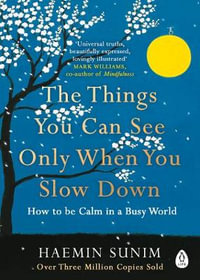

![When Things Fall Apart : Heart Advice For Difficult Times [Thorsons Classics edition] - Pema Chodron](https://www.booktopia.com.au/covers/200/9780007183517/5907/when-things-fall-apart.jpg)



